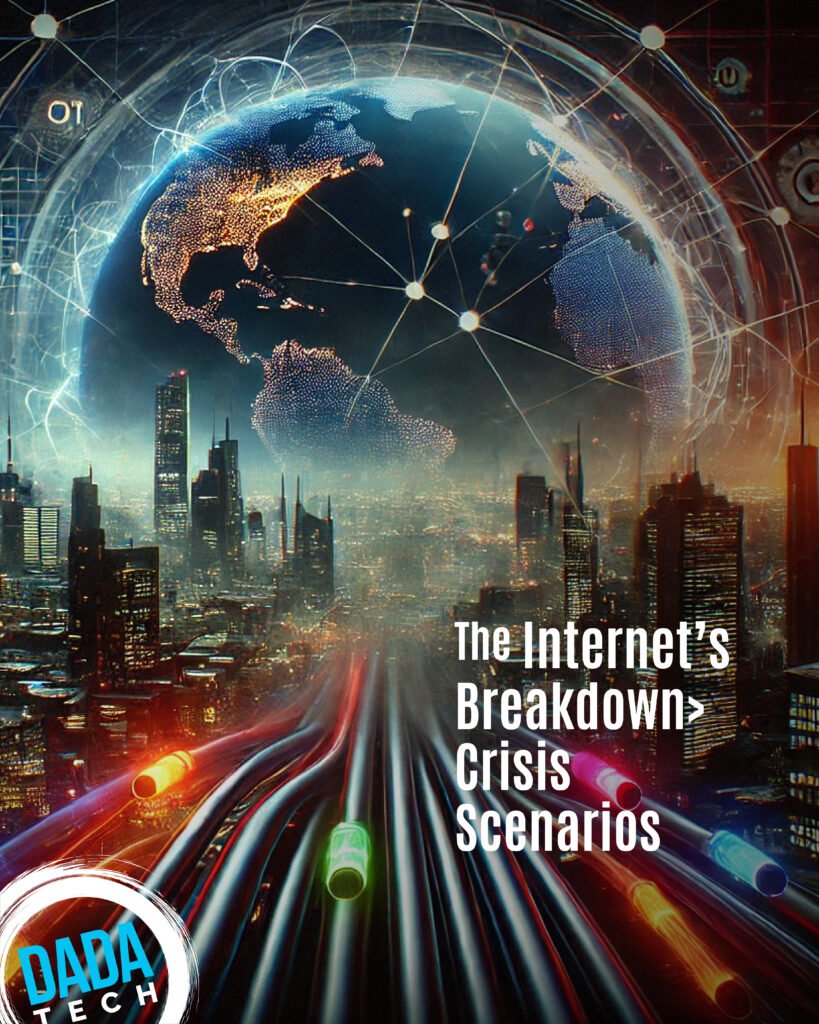The question of what would happen if the global internet were to be disrupted—whether by natural disaster, cyberattack, or geopolitical conflict—touches on one of the most profound vulnerabilities of the modern world. Today’s global society is deeply interwoven with the internet, from economic operations to social communications, governance, and even the basic infrastructure that keeps cities running.
In a hypothetical scenario where a rogue actor, such as a nation-state like China or Russia, decides to disrupt the global internet, we would face a wide range of potential crises. The implications are vast, ranging from technological paralysis to geopolitical instability. This analysis seeks to explore the possible outcomes of such an event, emphasizing the technical, economic, social, and geopolitical consequences.
The Technological Implications: Vulnerabilities in Global Connectivity
Disrupting the internet on a global scale would likely involve targeting critical network infrastructure, including undersea cables, Internet Exchange Points (IXPs), and major data centers. These represent the backbone of the global internet, through which the vast majority of global data flows.
China and Russia, as major cyber powers, have likely developed the capability to target such critical points of failure.
One of the first areas to feel the impact of an internet disruption would be regions heavily dependent on international data links. Many countries, especially those in developing regions, rely on these undersea cables and IXPs for global connectivity. A successful attack on these infrastructures could cause immediate blackouts in these regions.
The ripple effects would extend to even more digitally resilient countries, where slower network performance and congested traffic rerouting could cause significant delays in online services. Global cloud computing platforms, which undergird a large portion of the digital economy, would be severely impacted. Businesses and individuals who rely on cloud-based services would experience operational halts or slowdowns, making even simple transactions difficult.
Another likely outcome would be an increase in data security vulnerabilities. During such a chaotic period, cyber attackers could exploit weakened or breached systems to steal or manipulate sensitive information. Encrypted communication channels, which are critical for secure data transfers between governments, businesses, and individuals, could be intercepted or rendered useless.
The risk of data loss becomes particularly acute if disruptions reach data centers, which house enormous amounts of critical information. A sophisticated enough attack could render large portions of this data inaccessible or corrupt, leading to devastating consequences for industries such as finance, healthcare, and logistics.
Preparedness in IT Operations: Are We Ready?
IT departments across the world should already be planning for such catastrophic scenarios, given the rise of cyberattacks. Resilience planning, such as robust incident response strategies, is vital. Organizations need to ensure that backup systems are not only operational but also capable of handling higher-than-usual loads during an outage. Manual failover procedures, while antiquated, may be necessary to maintain some semblance of operational continuity.
Cybersecurity teams would need to be particularly vigilant. During any significant disruption, cybercriminals tend to take advantage of the chaos to deploy malware, phishing schemes, and ransomware attacks. For organizations that rely heavily on the internet, this dual threat of an infrastructure breakdown combined with malicious cyber activity presents a considerable challenge. Moreover, ensuring the continuity of critical industries—like healthcare or energy—that rely heavily on interconnected systems would be essential.
Diplomatic and Geopolitical Repercussions: A Global Response
From a geopolitical standpoint, a deliberate internet disruption would be considered an extreme act of aggression, prompting immediate diplomatic retaliation. Nations like the United States, European Union members, and their allies would be expected to respond with diplomatic, economic, and potentially military actions. Severe sanctions and international condemnation would be almost guaranteed.
The disruption of the internet would also likely escalate cyber warfare into physical conflict, as affected nations seek to retaliate against the responsible actors.
In addition to retaliatory cyberattacks, new alliances might form, focusing on collective defense against such threats. We might also witness a strengthening of global cybersecurity treaties, where nations pledge mutual support in defending critical digital infrastructure. New norms governing cyberwarfare could emerge, akin to those developed for nuclear weapons or conventional warfare. However, the ambiguity around cyberattacks—where attribution is often difficult—might complicate these diplomatic processes.
Economic Consequences: The Global Economy at Risk
The economic ramifications of an internet disruption are potentially catastrophic. Global supply chains, financial markets, and industries such as e-commerce, telecommunications, and even transportation are all heavily reliant on internet connectivity. A severe disruption would freeze online commerce, halt cross-border financial transactions, and impede the logistics that keep goods moving across the world.
The loss of confidence in global markets would lead to unprecedented volatility. Stock exchanges, which are almost entirely digitized, would experience chaos, with trading potentially suspended, leading to massive financial losses.
Industries like e-commerce and fintech, which depend entirely on digital infrastructure, would suffer enormous setbacks. Payment systems could collapse, making financial transactions impossible. Businesses that rely on just-in-time delivery systems would find their supply chains disrupted, leading to shortages and economic losses. As more sectors are disrupted, economies could spiral into recession or even depression, depending on the duration of the internet outage.
Social and Political Unrest: The Impact on Society
At the societal level, the immediate impact of losing internet access would be a significant loss of communication, especially in regions dependent on digital tools for information. Widespread panic is likely, as citizens are cut off from vital news sources, unable to contact loved ones, and deprived of the communication tools they depend on for daily life.
The spread of misinformation, already a challenge in the digital age, would likely increase, as the few remaining communication channels become susceptible to manipulation and disinformation. Propaganda could proliferate unchecked, especially in authoritarian regimes with control over their remaining communication networks.
Without access to reliable information, trust in institutions could erode, leading to increased civil unrest and even violent protests.
Governments might respond by attempting to restore order, but in countries already experiencing political or social tensions, this could spark widespread conflicts. Moreover, if the disruption is prolonged, it could exacerbate existing inequalities. Those with access to alternative means of communication, such as satellite phones or secure intranets, may be able to maintain some degree of connectivity, while those without access would be left in the dark, widening the digital divide.
Long-term Solutions: The Need for Resilient, Decentralized Alternatives
This scenario illustrates the global dependency on centralized internet infrastructure and the need for more resilient and decentralized alternatives. Solutions such as mesh networks, satellite-based internet services like Starlink, or other forms of decentralized communication could provide much-needed redundancy in the event of an internet breakdown. Governments and companies need to prioritize these alternatives to ensure continuity in case of future cyber-attacks or infrastructure failures.
Mesh networks, for example, allow for localized, decentralized communication that can function even when the broader internet is down. Satellite-based internet services offer another layer of redundancy, enabling communication in remote or disconnected regions. These technologies could become essential for national security and economic stability, as they would mitigate the risks posed by a centralized internet infrastructure. Furthermore, building stronger international coalitions focused on defending critical digital infrastructure could help prevent such catastrophes from occurring in the first place.
Conclusion: Can We Survive Without the Internet?
While it is possible to survive without the internet, the global disruptions caused by such an event would be far-reaching and devastating. The modern world is inextricably linked to digital infrastructure, and any disruption to this system would have profound implications for economies, societies, and governments. It is crucial for nations to recognize the fragility of this infrastructure and invest in more resilient systems that can withstand such disruptions. The answer is not to fear the internet’s loss but to build more robust and diverse systems that ensure continuity in the face of adversity.


